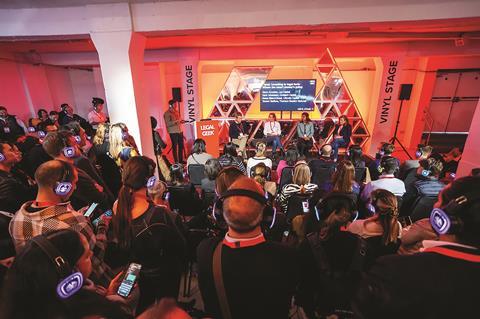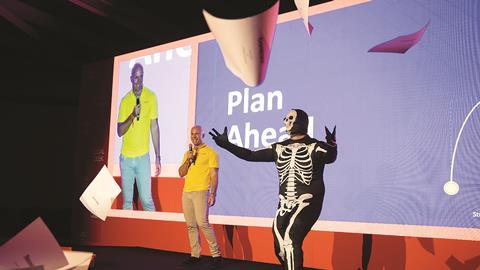With 4,500 attendees from 65 countries, Legal Geek’s annual conference was bigger than ever. But its focus has shifted
Legal Geek, in its 10th year and directly after its acquisition by Law Business Research (LBR), retained its focus on people, connections and community. The festival vibe, with selfies, high fives and speed networking, attracted even more attendees, many for the first time – and the first day ended with a karaoke party.

Initially, however, there seemed to be more gravitas than usual. Both days’ keynote sessions were delivered by knights of the realm – Sir Geoffrey Vos, master of the rolls, and Sir Stephen Fry, actor, broadcaster, writer, and national treasure.
The MR began with the observation ‘what a difference a year makes in the world of legal tech’. Adoption had replaced last year’s mix of scepticism and evangelism, as lawyers now accepted ‘that AI is just a tool like so many other tech tools we use every day’. The issue now is not around what AI can do, but the troubling ethical questions around using it for judicial decision-making. He highlighted two main objectives: to ensure that AI is used responsibly, effectively and safely in legal systems and processes; and to create an effective digital justice system to resolve legal disputes online and out of court.
Justice minister Sarah Sackman spoke about lawtech’s contribution to the economy. She noted the work of Lawtech UK in promoting access to justice and the UK’s position as the top lawtech destination, highlighting technology that is making a difference. She recalled her days working at the legal advice centre at Toynbee Hall, and spoke of prison technology that is helping prisoners prepare for rehabilitation.
Law Society CEO Ian Jeffery reminded us of the Law Society’s five missions. Number one is technology. The others are conditions for growth, access to justice, responsible business, and using data to enhance the member experience.
Legal Geek’s overarching themes reflected the MR’s opening keynote, with a sharp focus on GenAI adoption and integration. We heard from law firm leaders and innovators, in-house counsel, vendors and consultants, scale-ups and investors. At a time when ChatGPT is reporting 800 million weekly active users and legal tech funding is exploding, it was interesting to hear Gordon Crenshaw, partner at the LegalTech Fund, discuss the impact of new regulatory regimes and the GenAI ‘measurement problem’. According to McKinsey, eight in 10 companies are using GenAI, but it is having no impact on the bottom line. PwC, however, reports that GenAI is boosting profitability and productivity. MIT, though, found that 90% of GenAI pilots are not resulting in a contract.
Successful exit
An entertaining session on selling a legal tech business was led by Noah Waisberg, co-founder of Kira Systems, acquired by Litera, and Stuart Barr, former chief product and strategy officer at HighQ, now part of Thomson Reuters. The message was that a successful exit starts with getting all the stakeholders aligned with the deal.
A series of stakeholders joined them on stage to explain. Ben Wightwick of Autologyx (the colleague) noted that deals are done in numbers, but you need to bring your people with you and keep them motivated. Kerry Westland of Addleshaw Goddard (the customer) said you need to manage customer relationships and expectations. Haley Altman of Litera (the acquiring business) stressed that you need to get to know the people who want to buy your business, as they are almost always going to be your co-workers afterwards. Finally, Andy Wishart of contract lifecycle management platform Agiloft appeared in a skeleton suit, because the skeletons in the cupboard that can derail a deal are almost always in contracts – for example, non-compete clauses. Legal AI consultant Oz Benamram, meanwhile, appeared in a Care Bear costume because you should always expect the unexpected! Waisberg did not expect to sell Kira, and the HighQ acquisition took only four months to complete. But equally, deals sometimes fall through without an obvious reason. Sessions like this, which present useful information in a creative and humorous way, are part of Legal Geek’s personality, and a great differentiator.
Wishart is a legal automation pioneer, having founded Business Integrity, the company behind Contract Express (now part of Thomson Reuters) in July 2000. He talked about his 25 years in legal tech, focusing on three critical success factors for legal tech right now: ‘If we look historically across the evolution of contracting technology, you see changes in technology and approaches, but the underlying needs and problems to solve have remained relatively consistent. Three key problem areas are integration, integrity (controls/risks) and providing smart and intelligent analysis of contracts and contract data.’ These are directly relevant to this year’s buzz term – agentic AI (AI systems that can autonomously make decisions with limited supervision), which was represented in multiple sessions and in the exhibit halls.

Role model
MCP (model context protocol) integration is a relatively recent direction for legal GenAI. Richard Mabey, founder and CEO at AI contract automation platform Juro, announced its MCP integration with ChatGPT, which enables Juro’s clients to access its platform directly from ChatGPT. ‘We have always believed that meeting users in the tools in which they already live is the key to legal tech adoption, [so] legal tech products need to slot into existing conversational tools.’
Mabey continued: ‘While this is an ecosystem play for OpenAI, it poses the question of the extent to which OpenAI will be part of the legal tech market in the future. Will it continue to provide only the foundational models with a legal tech application layer on top, or will it build verticalised solutions for legal? Will lawyers conduct more of their work in these openly available tools?’ These are surely questions for providers and buyers of legal-specific GenAI.
Technology, history and community
The ‘Fireside Chat’ with Fry covered mythology, history and engineering, as well as technology. It included an analogy between large language models organising information and the industrial revolution when mechanical diggers replaced the human ‘navigators’ who dug canals. With GenAI, ‘we are no longer data navvies’, he said. But AI would not replace most jobs any time soon ‘because of Moravec’s paradox, whereby computers find things that we find difficult easy, but find things that we find easy unbelievably difficult’.
Legal Geek has always acknowledged the importance of mental health, and Fry described his own experience of bipolar disorder. Turning to the impact of technology on mental health, he referenced Hestia, the Greek goddess of the hearth and home. What Fry did not say is that it can also mean altar, which symbolises community and authority, two of the main tenets of law. Fry referred to the hearth as the traditional gathering point for families and a focal point for connection. He expressed concern that technology has led to a loss of community and storytelling as people disassociate from each other, turning instead to the internet and social media.
While this is a valid observation, in the Legal Geek setting it seemed ironic. The packed hall and overflow stage were a clear demonstration of the importance of community and storytelling in legal tech.
This year’s Legal Geek conference was bigger than ever, with 4,500 attendees from 65 countries. There were three stages, two workshop rooms and large exhibit halls and chill-out zones. The format is not about to change following its acquisition.
Pippa Lindsay, chief of staff at Law Business Research and ALM, said: ‘The team love the variation, from talks to workshops to karaoke, and the genuine sense of connection that everybody has. Legal Geek is a totally unique brand and we know how much people value the fun and approachable nature of the events.
‘We are not looking to change Legal Geek, and our role is to support Legal Geek with sustainable growth. Legal tech is growing globally and we think there is an opportunity to expand in the coming years, perhaps through new geographies, or leveraging other brands and communities from within our group.’
New directions
What had shifted was the original focus on start-ups, which seems to have been passed on to Lawtech UK, which Legal Geek delivers together with Edinburgh tech incubator CodeBase. The start-up alley was a flight of stairs away from the stages and exhibit halls, near the food trucks. This sounds like a good spot, but lunch at big events is for networking. People meet and eat; they do not visit vendor stands. This year, there were fewer start-ups and the area was noticeably less busy than the rest of the event. This is partly because Legal Geek is so much bigger – but so is legal tech. In 10 years, it has developed from a niche branch of enterprise tech into a sector that has the attention of the judiciary, government departments, professional bodies and, importantly, an enormous amount of funding.
Legal Geek founder Jimmy Vestbirk commented. ‘The 10-year mark is a reflective moment, not just for me but for the community. At Legal Geek 2025, I had some lovely conversations with people who attended our first few meetups – we have all grown up together over the past decade. And that includes the sector itself, which has gone from a group of disrupters to mainstream adopters. I’m proud to have shared this journey and excited for what lies ahead.’
































No comments yet